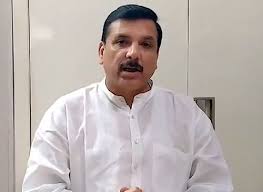The Supreme Court, on April 2, approved bail for Aam Aadmi Party (AAP) member of parliament (MP) Sanjay Singh in connection to the Delhi liquor policy scam.
Sanjay Singh’s bail arrives shortly after his party colleague and Delhi Chief Minister Arvind Kejriwal was apprehended by the Enforcement Directorate (ED) for his alleged involvement in the same case. Kejriwal is currently held in Tihar jail until April 15.
During the bail hearing, the Supreme Court questioned the ED regarding Singh’s prolonged detention without trial or recovery of purported bribe money. The ED, however, chose not to contest Singh’s bail. Additionally, Manish Sisodia, former Deputy Chief Minister of Delhi, is also detained in connection with the same case.
The apex court’s decision to grant bail to Sanjay Singh sheds light on the construction of the Prevention of Money Laundering Act (PMLA). Union lawyers informed the court of their decision not to oppose bail, thereby averting the need for a detailed judgment that could pose challenges for the ED’s case.
Sanjay Singh has been incarcerated in Tihar jail since October last year, following his arrest on money laundering charges related to the alleged liquor scam. Despite his detention, Singh was sworn in as a Rajya Sabha MP last month from within the jail premises. The AAP views Singh’s bail and the court’s observation as a validation of the party’s stance.
Several AAP leaders expressed confidence that Arvind Kejriwal, arrested in the same case, would eventually be proven innocent. They argue that Kejriwal and other AAP members are victims of false accusations.
The stringent provisions of Section 45 of the PMLA have come under scrutiny in Singh’s bail order. These provisions, added to the law during amendments in 2018, dictate strict conditions for bail in money laundering cases.
Although the SC bench clarified that Singh’s bail ruling would not set a precedent, it has drawn attention to the contentious bail conditions under the PMLA.
Singh’s bail marks a significant development after his pleas in lower courts and the Delhi High Court were rejected. The court’s decision permits Singh to engage in political activities ahead of the 2024 Lok Sabha elections, allowing him to campaign for the AAP, which currently sees its top leaders, including Kejriwal, detained.
Singh’s bail has injected optimism among AAP supporters, who anticipate similar relief for other party leaders, notably Kejriwal, in the Supreme Court if not in lower courts.

